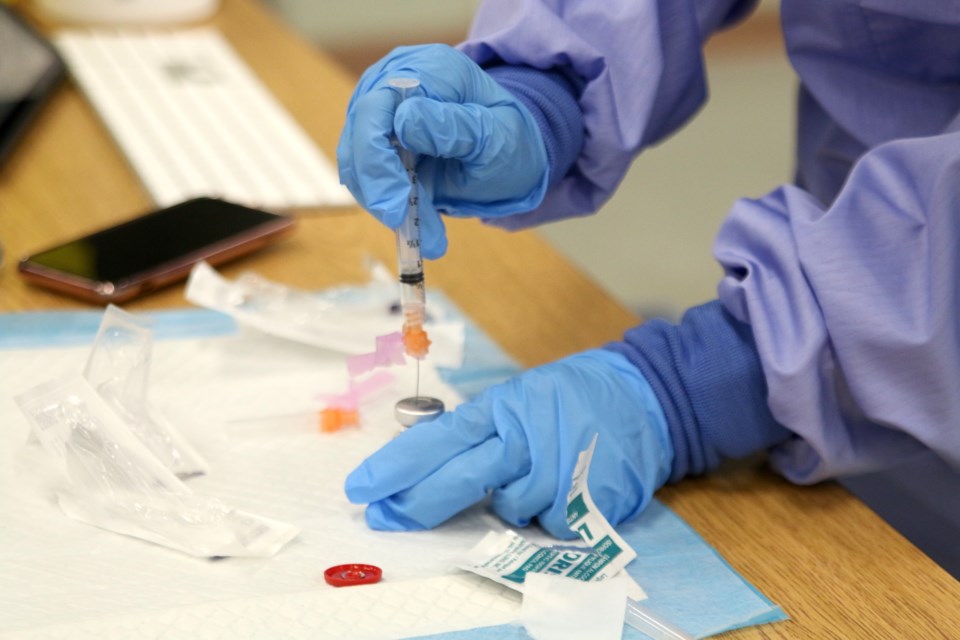THUNDER BAY - With the Thunder Bay District achieving another milestone in its vaccination efforts with more than 75 per cent of individuals over the age of 12 now having received two doses, the Thunder Bay District Health unit will keep its mass immunization clinic at the CLE grounds open in an effort to make vaccinations as accessible as possible.
“We are still seeing a fair number of people there every day, both for first and second doses and it’s walk-in style and people can also make an appointment,” said Thunder Bay District Health Unit medical officer of health Dr. Janet DeMille.
“We really want to continue to make it easy and convenient for people to get their immunization. Our commitment is really to ensure people have access to immunization. We know a lot of people have access to that clinic, so as long as people keep coming forward, we will keep it open.”
The number of weekly vaccine doses administered in the district has been declining in the last several months, with 2,355 doses administered last week. However, to date, more than 115,000 people in the district have had at least one dose.
DeMille said there are some areas with lower vaccination rates than others, particularly smaller and rural communities.
“For example, rural communities outside of Thunder Bay, as far down as Neebing by the border, have a bit of a lower rate compared to the city of Thunder Bay and that could be related to a number of different things. We have some upcoming clinics planned in that area,” she said.
Despite the declining weekly vaccination rates, DeMille said there are no concerns regarding vaccine wastage, as none of the vaccines are nearing an expiration date and the health unit continues to work with partnering organizations to ensure all doses are used.
The province also announced it will include vaccination status in its reporting of COVID-19 cases and hospitalizations. DeMille said given the numbers in the district are so low, there are no plans to use similar reporting methods locally, however, she does see value in that information being made available.
“I think it’s an important measure and what it really shows is how effective these vaccines are,” she said. “I think the important measures are the people who have serious illness and require hospitalization and ICU admissions and compare those, because that’s where these vaccines make a real difference, dramatically reducing severe illness and hospitalizations.”
There are currently five active cases in the Thunder Bay district and the highly infectious Delta variant has been detected in at least eight cases from the district since April.
According to DeMille, as more people get immunized, there will also likely be more reported cases among vaccinated people just based on the numbers.
“I think we are reaching around 100,000 people fully immunized. When you have that kind of proportion of people, you might start seeing more cases in those vaccinated people just because of the sheer numbers,” she said. “But when you look at those who are going to get severe illness, it will be largely in the unvaccinated people, which is a smaller population.”
And with case numbers beginning to increase in parts of Canada and the United States, along with reduced restrictions, there are fears of a fourth wave, which DeMIlle said would likely impact the district just like all previous waves.
“It does look like there is the start of a surge happening and it’s driven by the highly infectious Delta variant. It is concerning,” she said. “I do anticipate we will be impacted by that and we will see an increased number of cases. I am comforted by our high immunization rate though.”
The high immunization rate will mean fewer people experiencing serious symptoms from COVID-19 in the event of exposure. Though it remains important to continue to follow public health measures such as wearing a mask while in indoor public settings, as well as getting tested and isolating if symptoms arise, no matter an individual’s vaccination status.
“We know that people despite being fully immunized, if people are infected, they can pass it on to others,” DeMille said. “That is what we want to stop or at least slow down, the spread of the virus between people.”





.jpg;w=120;h=80;mode=crop)